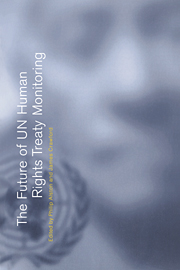Book contents
- Frontmatter
- Contents
- List of Tables, Figure, Appendices
- Notes on Contributors
- Editors' Preface
- Table of Treaties
- Table of Cases
- List of Abbreviations
- 1 The UN human rights treaty system: A system in crisis?
- A The UN human rights monitoring system in action
- B National influences and responses
- C Regional and sectoral comparisons
- 15 Reporting in the Inter-American system of human rights protection
- 16 Lessons from the reporting system of the European Social Charter
- 17 The role of reporting in international environmental treaties: Lessons for human rights supervision
- D Common challenges for the treaty bodies
- E Looking to the future
- Index
15 - Reporting in the Inter-American system of human rights protection
Published online by Cambridge University Press: 23 December 2009
- Frontmatter
- Contents
- List of Tables, Figure, Appendices
- Notes on Contributors
- Editors' Preface
- Table of Treaties
- Table of Cases
- List of Abbreviations
- 1 The UN human rights treaty system: A system in crisis?
- A The UN human rights monitoring system in action
- B National influences and responses
- C Regional and sectoral comparisons
- 15 Reporting in the Inter-American system of human rights protection
- 16 Lessons from the reporting system of the European Social Charter
- 17 The role of reporting in international environmental treaties: Lessons for human rights supervision
- D Common challenges for the treaty bodies
- E Looking to the future
- Index
Summary
Human rights reports: legal basis, forms and objectives
By and large the international protection of human rights is undertaken through three basic procedures – petitioning, reporting and fact-finding, together with their variations. They operate either when invoked, as in the petitioning system, or on a periodic ex officio basis, as in the reporting system. These methods of protection cannot be seen in isolation; in practice, they may be related. For example, the petitioning and reporting systems may require, or bring about, in loco investigations. In its own way each system endeavours to coordinate actors and resources for the protection of human rights. Hence the petitioning system seeks to avoid duplication or conflict of jurisdiction and interpretation, the reporting system promotes standardisation and consolidation of guidelines, and the fact-finding system facilitates consultation and exchange of information.
Within the framework of the international protection of human rights, reports take a variety of forms. First, one may distinguish reports of states from reports of international organs. The expression ‘reporting system’ is normally used in reference to reports of states parties to human rights treaties which are made to the international supervisory organs established under those treaties. These reports can be periodic (i.e. regularly submitted in cycles), or submitted upon the request of the international organ concerned. Human rights reports lato sensu also encompass reports produced by international human rights supervisory organs. For example, besides producing the usual form of annual reports, the Inter-American Commission of Human Rights (IACHR) prepares reports, linked to its fact-finding function, on the human rights situation in certain member states of the Organization of American States (OAS).
- Type
- Chapter
- Information
- The Future of UN Human Rights Treaty Monitoring , pp. 333 - 346Publisher: Cambridge University PressPrint publication year: 2000
- 2
- Cited by



